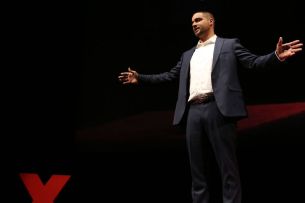I recently gave this talk titled, “More Than a Score,” for the TEDx Rainer event at Seattle’s McCaw Hall theater. In this talk I advocate for the great uprising against reducing our children to a test score and I make an argument to opt in to authentic assessments–not only because it will better engage students, but also because the future of our society and planet depend on it.
—
 Jesse Hagopian is a high school history teacher and associate editor for Rethinking Schools magazine. Jesse is the editor of, More Than a Score: The New Uprising Against High-Stakes Testing. Follow him on his blog, IAmAnEducator.com or on twitter, @jessedhagopian
Jesse Hagopian is a high school history teacher and associate editor for Rethinking Schools magazine. Jesse is the editor of, More Than a Score: The New Uprising Against High-Stakes Testing. Follow him on his blog, IAmAnEducator.com or on twitter, @jessedhagopian




You are such a hero, Jesse. KEEP IT UP!
LikeLike
Reblogged this on staciedern and commented:
Love TedX and this is the right message for our schools. Authentic assessments that are capable of measuring real growth- that is what is missing in education.
LikeLike
“In the heart of a child, one moment …. can last forever.”
About this testing …
There is no virtue in making children so brave that they might withstand the idiocy of adults. Nor is there any virtue in lying to children so as to protect adult ridiculousness. And when adults trip over their own commandments and reason away the subtle wounding of children … then they themselves have committed a great sin.
Childhood is an extraordinary moment. It has its own sanctity because it is the maker of first memories … and we make big deals of firsts in our lives. And first memories should never be ugly. Not ever.
But what has become of us? Why have we arrived at this moment when children become fair game in an adult controversy? Instinct tells us never to place children in the middle of a muddle. But here we are … hearing unbelieving tales of adult unfairness that seem such the antithesis of what is expected from the guardians of our children.
Life is a long frustration. The great beauty of maturity is that we learn to keep our cool and to react only to the most insistent frustrations. Adults learn to separate the important from the unimportant … and it prevents us from the nasty human inclination to settle on easy scapegoats … and then to punish the weakest and most vulnerable.
Scapegoats are born of frustrations adults cannot control … and we have loads of frustration surrounding this wretched reform. But frustration is never a green light to exercise a disturbing dominance over the smallest of the small. If that is the first impulse of an adult, then they are in a queer orbit.
Children cut off from pizza parties and ice cream treats because their parents exercised their right of refusal? Little humans in little desks made to sit and stare for hours … in of all places … a school? Children confronted by some towering goliath … insisting that they revoke their parents’ own wishes? What the hell is going on here?
Where is the wisdom in gluing children to desks for hours as they squirm their way through some asinine educational gauntlet that has no real purpose other than to pay homage to some testing god? Who thought that a good idea?
This is a mess that cannot be unmessed. When will we start over … and get this straight?
Is this how children should ever be treated? Are there not school campaigns to disarm bullies … and to champion kindness? Have those champions vanished? Were those just paper heroics? Empty nonsense? I sense adult ugliness seeping through a holy firewall behind which childhood is protected. It seems too many are now comfortable liars … even with children. And worse, some have become hypocrites.
There is never an excuse to scar a child. And if you’re in the child business … that sort of action condemns you to a special sort of hell.
For children, school is a majestic cathedral. A near shrine where every minute should be crammed with as much wonder as a minute might hold. To disturb that atmosphere is to violate the inviolate,
A school has no place or space for anyone unable to plug into their memory bank for recollections of their own childhood. If one cannot stay linked with the memories of their own past, perhaps they shouldn’t be in the memory-making business at all.
When one’s memory of childhood evaporates, so does one’s empathy. And that is a signal to move on.
“Childhood is a short season.” Give it its due.
Denis Ian
LikeLike